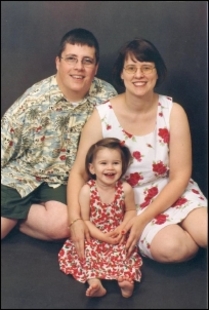| WHAT TO TELL PEOPLE WHO MAY THINK DSD ARE SINFUL | ||
|---|---|---|
 | Chapter 3 HOW TO TALK WITH OTHERS |  |
Some religious groups see human sexuality as mostly sinful. Some also (wrongly) think that people come in only two types, fully male, or fully female. As a result, a few people may find your child’s DSD very frightening, because DSD challenge their ideas about human sex and sexuality.
But here’s a thought to try with them: “God doesn’t make mistakes.” That’s the saying that many religious parents of children with DSD use to sum up why they feel God loves their children just as much as any other child.
Ann Thompson Cook has written two booklets that educate, from a religious perspective, about people who are different from the average in terms of their genders and sexual orientations. (See Chapter 7 OTHER RESOURCES (WHERE TO LEARN MORE) for how to get them.) As she’s writing about DSD, she reminds us that people of faith are fond of saying that each of us is “made in God’s image.” Here are questions she invites people to think about:
What if each of us really is made in God’s image, even when some of us don’t look or act in ways that match the conventional view of male and female?
What if God’s love of diversity—which we see in our world in the amazing variations of flowers, trees, fish and wildlife—extends to humans, too?
And what if God is well pleased?

Ann reminds that “Again and again, Jesus spoke with and touched outcasts, people whom those in power would exclude. Jesus was unwilling to condemn anyone for being different. Instead, he condemned rigid conformity to rules that marginalized or excluded people. Jesus’ central message is that God’s love and grace extend unconditionally to all of us. Not because we look or act a certain way, but because we’re all children of God. Each of us is a beloved child of God. No exceptions. The challenge, as always, lies in the opportunity to live out that grace in all our relationships.” We encourage you to help people of all religions realize that your child, like all others, is truly worthy of God’s love and our love.
Remember that people’s negative reactions often come out of their fear and ignorance. If you meet someone who thinks he can’t accept your child because of his religious beliefs, consider that maybe he can’t accept your child because he doesn’t yet understand DSD. Try to take the time to explain your child’s DSD and see if that helps reduce his fear or ignorance.
 |
© Accord Alliance a project of the Tides Center |
accordalliance.org |